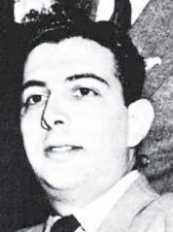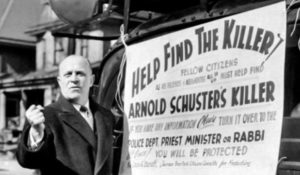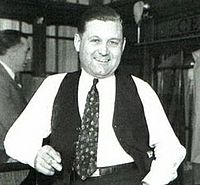 In 1952 the Shadow posed the question “Who knows what evil lurks in the hearts of men?” Every week Eliot Ness and his cohorts crashed into your living room to show society’s misfits who was boss, and in the afternoons the Green Hornet and Kato fought injustice and corruption for the greater good.
In 1952 the Shadow posed the question “Who knows what evil lurks in the hearts of men?” Every week Eliot Ness and his cohorts crashed into your living room to show society’s misfits who was boss, and in the afternoons the Green Hornet and Kato fought injustice and corruption for the greater good.
Also in 1952 Menswear Salesman and Amateur Detective Arnold Schuster caught the eye of the American public for a month.
It was the last month of his life.
In the February of that year Willie “The Actor” Sutton had made his escape from Philadelphia County Prison dressed as a prison guard. It was the third escape for Sutton, who was becoming a folk legend to the people of New York, as well as an embarrassment to the police and FBI.
The fugitive, Sutton, was a professional bank robber who had not hurt a single person in his entire career. Named as the “Eleventh Most Wanted Fugitive” in the United States, he was known as a gentleman and a clothes horse, and investigators hoped to use that to their advantage.
Willie Sutton’s face graced the cover of every crime magazine in America, but the authorities wanted to make him the most recognizable man in New York. Brooklyn police went to every menswear shop in the borough to distribute photos of the fugitive. Hiding in Brooklyn at the time, Sutton grew a thick mustache and moved about the city in obscurity.
At least until the afternoon of February 18th.
Arnold Schuster rode the subway to his job as a clothes salesman. The job was less than exciting and Arnold, a man who had served in the Coast Guard and had spent his entire young life absorbing daring tales on the radio and in comics, imagined more. He daydreamed on the way to work, absently taking in his surroundings, when the man across the car caught his attention.
His face looked familiar. Very familiar. The feeling that he had seen this man before kept nagging at Arnold and when the man rose from his seat to leave the subway car, it came to him.
He had been sitting across the aisle from the famous bank robber, Willie Sutton.
Following Sutton from of the car, Arnold tailed the robber as he walked down Third Avenue. He stayed a block back from the fugitive, and we can only imagine the thoughts that flew through his head.
Sutton walked to a gas station and got into a car. He tried to start it but no soap. The battery was dead so he asked an attendant if he could get a jump. Soon Sutton would be gone and Arnold would have missed his big break.
Arnold walked around the corner and chanced upon two policemen. He interrupted their discussion by saying “You’ll probably think I’m crazy, but I just saw Willie Sutton.”
Officers Donald Shea and Joseph McClellan sighed and strolled around the corner where they came face-to-face with the “Most Wanted” man in America.
“Are you Willie Sutton?” the officers asked the man at the gas station.
“Of course not,” replied Willie Sutton, always good-naturedly. “My name is Gordon.”
“Ah…okay,” said the patrolmen as they wished Willie Sutton a good day and walked on.
From a block away Arnold Schuster saw the exchange and shook his head. He could have sworn that was Willie Sutton, laughing as he walked to work. Obviously he had to have the wrong guy.
Back at the station, the two patrol officers had a good laugh and shared the story of the “crime-busting” citizen with their superior, Detective Louis Wiener, who thought a little more of the encounter.
That night, while listening to the radio, Arnold Schuster heard the breaking news that fugitive bank robber Willie Sutton had been apprehended by hero police officers Shea, McClellan, and Wiener.
Earlier in the day, the three officers had thought it over and brought Mr. “Gordon” down to the station for a talk. Sutton denied his identity right up until they had him in the interrogation room, where he finally congratulated the officers on capturing Willie Sutton.
All three detectives were to receive promotions, but Arnold Schuster was left out in the cold.
He went to the papers and told them of his part. Reporters then took the story to the Police Commissioner George Monaghan, who was quick to apologize and hand Arnold a piece of the congratulatory cake that was being passed around the police station.
“I want publicly to commend Arnold Schuster for the great help he gave the police force in ridding the land of one of its most notorious criminals,” Monaghan said. “If all citizens would give such help, it would make our burden easier.”
Soon newspapers were splashing pictures of Arnold all over their front pages. He was interviewed by radio stations, and even the television show “I’ve Got A Secret” is said to have featured him as a guest.
When Arnold reached out to the authorities to collect his reward, however, he found that no actual reward existed.
The police who brought in Willie Sutton received promotions, and the reporters who published stories of Arnold Schuster sold papers, but when all was said and done, Schuster himself received $750 for a few television appearances.
But of course there was the fame.
 Over the course of the week, Arnold Schuster was the toast of New York, and legend has it that Albert Anastasia grew tired of seeing Arnold on television.
Over the course of the week, Arnold Schuster was the toast of New York, and legend has it that Albert Anastasia grew tired of seeing Arnold on television.
“I can’t stand squealers!” he was reported to say, ordering the hit of the young menswear salesman from Queens.
Anastasia had nothing to do with Willie Sutton. He never employed the man, never worked with him, and he never even met Arnold Schuster.
He simply felt that the roles of police and criminals were established and that the “little guy” had no part of their game.
“Anastasia was really off his rocker,” Lucy Luciano said later. “He was startin’ to see himself like some guy in the old gangster movies.”
But off his rocker or not, he still led Murder, Inc., the enforcement arm of the mob, and his will was law.
On Saturday night, March 8th, 1952, Arnold Schuster walked home from his shift at his father’s menswear store. It was dark, he was tired, and he had his keys out as he headed to the front door. On radios throughout the neighborhood, Gangbusters played, and at 9:10PM the neighbors heard a series of shots fired.
They ran out and found Arnold Schuster already dead on the sidewalk. A bullet entered each eye and there were two shots to his groin.
His death was a huge statement to the public.
Immediately outrage poured from all parts of society. “This murder, above any crime in my memory, was an offense against all the decent people of the City of New York,” said Mayor Vincent Impellitteri. “With the possible exception of the Lindbergh baby,” echoed former Brooklyn prosecutor Burton Turkus, “no single murder in the past 25 years has so shocked or outraged the American public.”
In prison, even Willie Sutton was shocked about the loss of life associated with him. He had no association with Anastasia and bore Arnold Schuster no ill will. He even offered to contribute thousands to the reward pool that was growing, but was persuaded by the police not to.
It just wouldn’t look right.
Arnold’s parents blamed the papers for making their boy famous and the police for not protecting him. Eventually the city settled with the Schuster’s for $41,000, but no arrest was ever made and Arnold’s murder passed out of public memory.
In the end the killing of a young menswear salesman from Queens who was trying to do the right thing served as a cautionary tale against going up against the mob. But the cost of doing good was more than he could ever have imagined.

